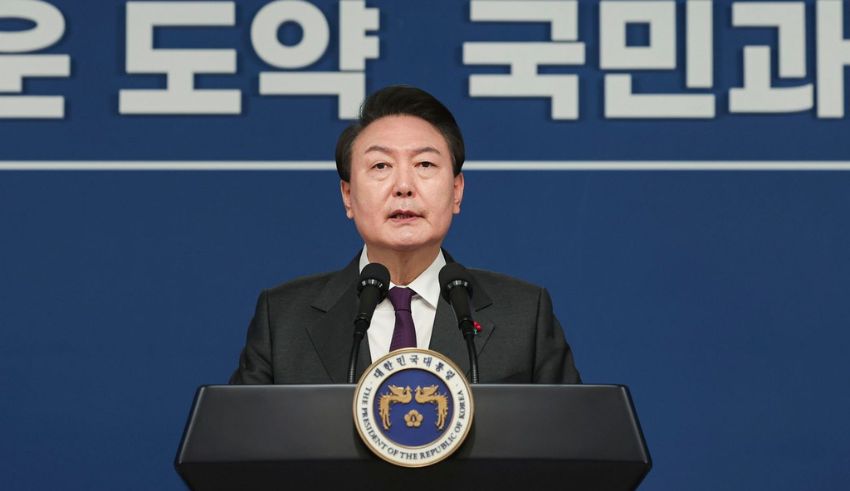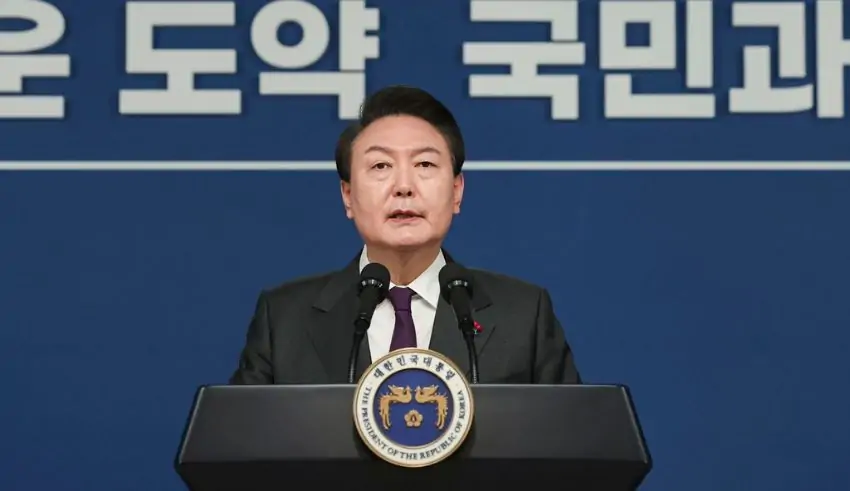

(C) WSJ
South Korea is scheduled to hold its 21st legislative elections on April 15, 2024, which will determine the composition of the 300-member National Assembly for the next four years. The elections are seen as a crucial test for the ruling Democratic Party and its leader, President Moon Jae-in, who will face his final year in office in 2025. The elections are also seen as a precursor for the 2025 presidential election, which will decide the successor of Moon.
The main contenders in the elections are the Democratic Party, which currently holds a slim majority of 163 seats in the National Assembly, and the main opposition People Power Party, which holds 103 seats. Other parties include the Open Democratic Party, the Justice Party, the People’s Party, and the Future Korea Party. The elections will be conducted under a new mixed-member proportional representation system, which will allocate 47 seats based on the proportion of votes each party receives, in addition to the 253 seats that are directly elected by the voters.
North Korea has been taking various actions against South Korea in the run-up to the elections, such as:
North Korea has been testing and launching several short-range and medium-range missiles, as well as conducting large-scale military exercises, in the past few months. The latest missile launch was on March 25, 2024, when North Korea fired two ballistic missiles into the Sea of Japan, violating the UN Security Council resolutions and drawing condemnation from the international community. The missile launches and military drills are seen as a show of force and a provocation by North Korea, which aims to pressure and intimidate South Korea and its allies, such as the U.S. and Japan.
North Korea has been cutting off all forms of communication and cooperation with South Korea, such as the inter-Korean hotline, the liaison office, and the joint projects. The latest cut-off was on March 9, 2024, when North Korea announced that it would sever all ties with South Korea, accusing it of being hostile and subservient to the U.S. The cut-off of communication and cooperation is seen as a sign of frustration and anger by North Korea, which feels betrayed and ignored by South Korea and its efforts to improve the inter-Korean relations and to facilitate the denuclearization talks.
North Korea has been spreading propaganda and misinformation against South Korea, such as the leaflets, the radio broadcasts, and the online posts. The latest spread was on March 18, 2024, when North Korea sent millions of leaflets across the border, denouncing the South Korean government and the ruling party as corrupt and incompetent, and urging the South Korean people to vote them out. The spread of propaganda and misinformation is seen as a tactic of influence and interference by North Korea, which aims to sway and manipulate the public opinion and the election outcome in South Korea.
North Korea has several reasons for taking these actions against South Korea, such as:
North Korea is unhappy and disappointed with the lack of progress and results in the dialogue and diplomacy with South Korea and the U.S., which have been stalled since the failed summit between Kim Jong-un and Donald Trump in Hanoi in February 2019. North Korea feels that its goodwill gestures and concessions, such as the moratorium on nuclear and long-range missile tests, the dismantlement of some nuclear facilities, and the return of some U.S. soldiers’ remains, have not been reciprocated or rewarded by the U.S. and South Korea, which have maintained the sanctions and the military pressure on North Korea.
North Korea is trying to increase its bargaining power and leverage in the future negotiations with South Korea and the U.S., which it hopes to resume after the elections. North Korea believes that by demonstrating its military capabilities and its willingness to escalate the tensions, it can gain more respect and attention from the U.S. and South Korea, and can extract more concessions and incentives from them, such as the easing of sanctions, the declaration of the end of the Korean War, and the security guarantees.
North Korea is trying to influence the domestic politics and the public opinion in South Korea, which it considers as a key factor in the inter-Korean relations and the denuclearization process. North Korea prefers a more friendly and cooperative government and society in South Korea, which can support and facilitate its engagement and dialogue with the U.S. and the international community. North Korea also wants to undermine and weaken the more hostile and confrontational forces in South Korea, which can oppose and obstruct its interests and goals.
North Korea’s actions have various implications for South Korea and the elections, such as:
North Korea’s actions will increase the security and stability risks and challenges in the region, as they could trigger a military conflict or a crisis, either intentionally or accidentally, with South Korea and its allies. The actions will also increase the uncertainty and unpredictability of North Korea’s behavior and intentions, making it harder to manage and resolve the issues and disputes.
North Korea’s actions will affect the election campaigns and platforms of the parties and candidates, as they will have to address and respond to the public’s concerns and expectations regarding the inter-Korean relations and the denuclearization issue. The actions will also highlight and polarize the differences and debates among the parties and candidates, as they will have to present and justify their visions and policies on how to deal with North Korea.
North Korea’s actions will influence the election results and the future direction of the inter-Korean relations, as they will shape and sway the voters’ preferences and choices. The actions could either boost or hurt the ruling party’s chances, depending on whether the voters perceive them as a threat or an opportunity, and whether they trust or doubt the government’s ability and approach to handle them. The actions could also either facilitate or complicate the future dialogue and cooperation between the two Koreas, depending on the outcome and the mandate of the elections.
OpenAI updated ChatGPT-4o to include its best text-to-image tools so free users can generate Studio Ghibli artwork by giving basic…
The stepping down of Piyush Gupta from the post of CEO of DBS Bank came after 15 years of leading…
The Delhi Directorate of Education releases 2025-26 marks for year-end tests in school levels 6 through 11. Online test data…
Singapore will further cement its status as an important basketball destination when it hosts three FIBA 3x3 events in 2026…
Jewel Section E, directed by Theodore Boborol and starring Ashtine Olviga as Jay-Jay Mariano, Andres Muhlach as Mark Keifer Watson,…
Cebu Pacific celebrates the delivery of its very first aircraft for 2025, the 459-seat Airbus A330neo, delivered at Ninoy Aquino…
This website uses cookies.
Read More